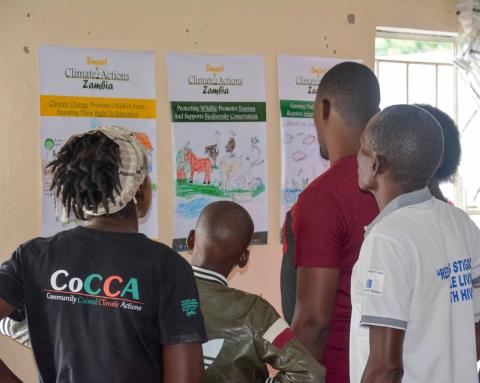Climate crisis swings rural school children into action in Zambia
Climate crisis swings rural school children into action in Zambia
Knowledge-into-Use award recipient, Enoch Mwangilwa, highlights the impactful story of children from the Chongololo and Chipembele Conservation Clubs in Itezhi-tezhi, a rural district in Zambia. These young individuals are making an impact by utilising art and peer-to-peer climate and environmental education to inspire their communities to adopt sustainable practices.
This post originally appeared on Global Resilience Partnership’s website.
Itezhi-tezhi, a rural district in Zambia’s Southern Province, is located west of Kafue National Park. The communities here enjoy part of the mighty Kafue River. The land is endowed with natural forests and water bodies, including the manmade Itezhi-tezhi dam constructed in the early 1970s as a source of hydroelectricity.
Unfortunately, in Itezhi-tezhi district, climate change is ravaging the lives and livelihoods of the communities of Masasabi, Nahubwe and Baanga, amongst others, making children, women, elderly and people living with disabilities very susceptible to shocks and stresses.
In 2019, communities were plagued by the devastating effects of droughts. They faced a lack of access to clean and safe drinking water, as well as pest infestations that resulted in the loss of thousands of livestock. The damage that droughts and floods caused extended beyond the loss of livestock and drinking water. The infrastructure, including roads, clinics, houses and schools, suffered damage, and food shortages and hunger became prevalent. Unfortunately, the situation worsened in the 2022-2023 rainy season.
In these communities, children are experiencing the impacts of climate change and observe elderly community members struggling to earn an income and feed their families. Agriculture is the main source of livelihood in this area and it has also been affected by climate impacts. This has led farmers to resort to unsustainable practices, including clearing trees for farmland expansion, illegal charcoal production, poaching and illegal timber extraction. These practices further exacerbate the climate crisis. It is important that future generations learn how to meet their needs while living harmoniously with nature.
Children who are members of the Chongololo and Chipembele Conservation Clubs of Zambia (CCCCZ) are learning how unsustainable community practices and climate change are affecting their future. The children from Masasabi, Nahubwe and Baanga Primary Schools of Itezhi-tezhi district have chosen to take a stand. The clubs are run by WECSZ, with support from Elephant Charge and the VCA programme.
Art depicting climate change impacts and unsustainable practices
When asked to express how climate change affects them and their communities, the children drew images of various climate change impacts. These illustrations included floods, droughts, infrastructure damage and food insecurity, depicting how floods wash away bridges and affect their homes, how people must swim across the river, and how livestock and even people drown. The children also depicted how droughts limit their access to clean and safe water and food.
In addition, children identified some of the common unsustainable community practices that contribute to climate change and further threaten livelihoods. These practices include illegal charcoal production, uncontrolled bushfires, bad fishing methods, water pollution and poaching. This shows how observant the children are, as they watch their future being robbed, sometimes without realising it.

The children’s drawings also illustrated various solutions to address the climate crisis and unsustainable community practices. Additionally, the art was used to share awareness messages to deter other community members from engaging in unsustainable practices.
Currently, the children's art is being used as a key part in community awareness raising and school-based peer-to-peer climate and environmental education. They have also co-created simplified anthems and chants to call community members and stakeholders to climate action. Some of their chants include:
“It is my nature to nurture nature, what about you?”
“Environmental conservation is key to human survival!”
Peer-to-peer climate education
With the Knowledge-into-Use award, three teachers and six children (three boys and three girls) were trained as climate change facilitators. Their mission is to strengthen peer-to-peer climate education in their schools. This dedicated team mobilised 119 other pupils in their respective schools: Masasabi, Nahubwe and Baanga primary schools. The teams initiated climate-smart gardens in their schools and planted over 1500 trees and fruit trees. Through their actions, they have demonstrated climate action and inspired their communities to adopt climate-smart practices such as agroforestry, organic gardening and orchard establishment. They aim to reach 600 more children out of a population of 1465 across the three schools by the end of 2023.
